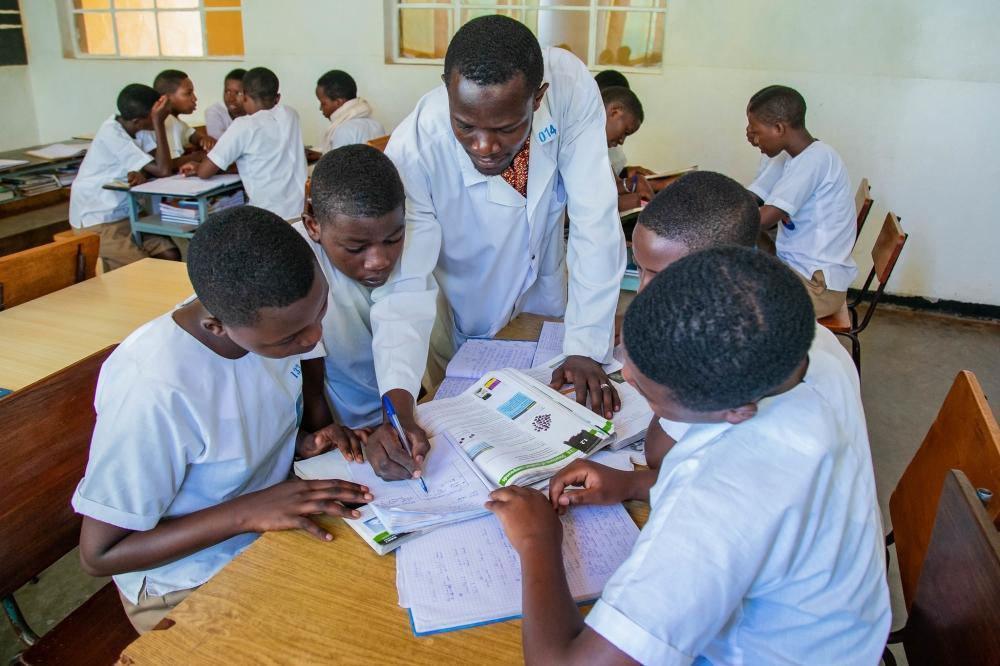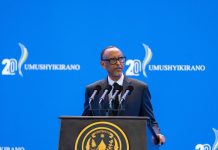Africa-Press – Rwanda. More than 15 years after Rwanda adopted English as the medium of instruction, a significant portion of the country’s teachers still lack the proficiency required to deliver lessons effectively in the language, according to the Ministry of Education.
To address the issue, the government has embarked on a multibillion-franc initiative to raise English language skills across the teaching workforce.
As per the Ministry of Education, various national assessments have shown that many teachers’ English proficiency remains below the level needed for effective instruction, which negatively affects students’ academic performance and overall classroom engagement.
Only some 4 per cent of primary school teachers currently meet the B2 (Upper Intermediate) level of proficiency, while about 38 per cent of secondary school teachers meet the required standard, according to the Education Sector Strategic Plan which runs from 2024/2025 through 2028/2029.
According to the British Council, learners at the B2 Upper Intermediate level can understand the main ideas of complex texts on both concrete and abstract topics, including some technical discussions.
They can also express themselves fluently and spontaneously enough to comfortably communicate with other English speakers, and produce clear, detailed writing on a wide range of subjects, including explaining a complex viewpoint and discussing advantages and disadvantages.
As part of efforts to bridge the existing gap, the country is implementing a major in-service teacher training programme under the Rwanda Quality Basic Education for Human Capital Development Project (RQBE) — a government initiative supported by the World Bank.
Dubbed training teachers on English proficiency, the project was implemented through Rwanda Basic Education Board (REB). The total budget for the execution of the initiative, which started in 2025, is Rwf32 billion.
“This proficiency gap is precisely why the RQBE project has prioritised English training, with targets to raise primary teachers’ proficiency from 4 per cent in 2023/24 to 90 per cent by 2027/28 and secondary teachers from 38 per cent to 75 per cent within the same period, eventually reaching 95 per cent by 2028/29,” Flora Mutezigaju, the Deputy Director General at REB, told The New Times.
Mutezigaju said that the RQBE project was launched in June 2022, and on May 13, 2025, REB signed a contract with Education First (EF) – a global leader in language Education – to deliver large-scale English language training to teachers.
The EF-led training programme runs from May 2025 to May 2027, targeting 38,000 teachers across all education levels: pre-primary: 2,537 teachers, lower primary: 15,628 teachers, upper primary: 9,836 teachers, and secondary: 9,999 teachers.
“While this cohort is the immediate focus, the government’s long-term target is to train the entire teaching workforce of over 116,000 teachers and school administrators by 2029, ensuring that all reach at least B2 (Upper-Intermediate) proficiency according to the Common European Framework of Reference for Languages (CEFR),” Mutezigaju said.
What will it take to meet the set targets?
Mutezigaju outlined the key steps needed to achieve the English proficiency targets set in the Education Sector Strategic Plan which runs from 2024/2025 through 2028/2029.
They include sustained investment in teacher training, already budgeted at Rwf32 billion for the English proficiency program; regular monitoring and evaluation, to track teacher progress and address challenges in real-time; and continuous professional development opportunities to reinforce English use in classrooms beyond formal training.
They also feature access to supportive learning resources and technology to increase teachers’ access to interactive English learning materials; and collaboration with partners such as EF, higher learning institutions, and teacher training colleges to sustain capacity building.
“The expected impact is significant: once the workforce reaches B2 level proficiency, all teachers will be able to effectively deliver lessons in English, which is the medium of instruction across Rwanda. This will improve not only classroom interaction and learning outcomes but also students’ preparedness to compete in the global knowledge economy,” she said.
Teachers’ union welcomes the initiative
Stephanié Mukangango, General Secretary of the National Union of Teachers in Rwanda (SNER), welcomed the initiative as a critical step toward improving education quality.
“This project is important for ensuring all teachers are trained and meet the required English proficiency standards,” she said.
Mukangango observed that some of the current teachers were educated when French was still the medium of instruction in Rwanda, making the transition to English a challenge for them.
“For them to teach in English, they must either adapt quickly or undergo extensive training. That’s why the government launched this programme – to help them catch up,” she explained.
“This initiative responds to the ongoing need for continuous professional development, especially in language skills, to maintain and improve education quality in Rwanda,” she added.
Meanwhile, a Prime Minister’s Order issued in November 2024, mandates that teachers must undergo English proficiency testing every three years – after completing probation. If a teacher fails the exam twice consecutively, they face dismissal.
The policy applies to all staff within Rwanda’s basic education sub-sector, which comprises pre-primary, primary, and secondary schools.
For More News And Analysis About Rwanda Follow Africa-Press






